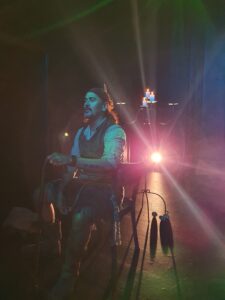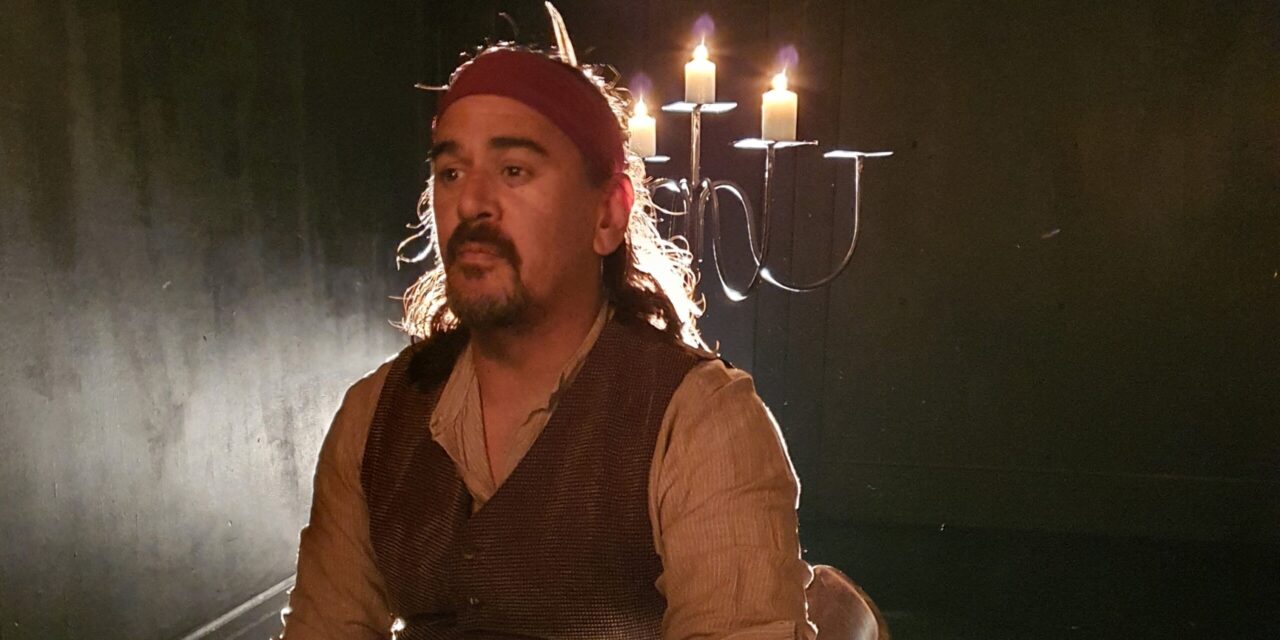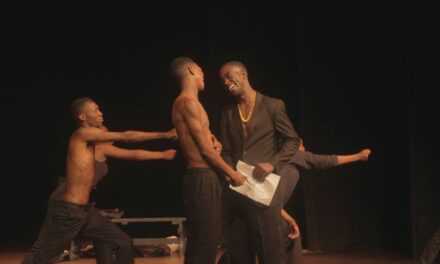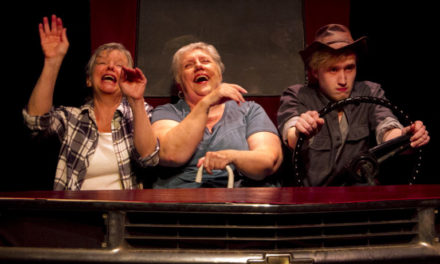Company Kamupene Written and performed by Jamie McCaskill. Presented by Tikapa Productions and The Māori Sidesteps Collective. Directed by Simon Ferry and Craig Geenty. BATS Theatre, Wellington 23-27 February 2021
Is comedy an appropriate form for addressing New Zealand’s fraught history of colonialism, racism, and intercultural conflict? This question pulses through Jamie McCaskill’s new solo show Company Kamupene, which uses humor to open up the story of the battle of Moturoa Pa during the New Zealand Land Wars. The play is very much in the satirical tradition of the musical troupe The Māori Sidesteps, of which McCaskill is a founding member and company director.
The Land Wars were fought throughout New Zealand’s North Island from the 1840s to the 1870s as Māori iwi (tribes) defended their land and people against invasion by British colonial forces. In November 1968 the renowned rangatira (chief) Tītokuwaru defeated troops led by Colonel George Whitmore at Moturoa Pa in Taranaki, a significant victory for Māori. McCaskill’s script weaves together the story of Tītokuwaru’s victory with the exploits of the fictional Company Kamupene, a bunch of misfits led by the idealistic Captain Māori. There’s a joke in the title, kamupene means “company” in te reo (Māori language), and the captain only has four men under his command. He leads them on a mission to scale Mount Ruapehu only to find they’ve climbed the wrong peak. The captain proclaims himself as a “half-caste”, envisages a hopeful future where Māori and Pakeha can live together in peace and attempts to intervene in the battle to prevent bloodshed. The fact that he fails to achieve this vision says much about the legacy of colonialism and the Land Wars in New Zealand today.

Jamie McCaskill in Company Kamupene. Photo Sonia Hardie
McCaskill is a superb storyteller and shapeshifter. Clad in colonial-hybrid-haute couture including blanket kilt, scruffy boots, waistcoat, headband, and feather, he signals his parodic mission at the outset by sending up some of the tropes of Māori theatre: a brilliantly mimed collage of native birds, insects, traditional Māori instruments and the gods of wind, sea, and war. He creates vivid portraits of each of the company members from the jilted lover Doctor Hōpe to the laid-back Corporal Kikorangi, whose rapping is described by his captain as “aggressive poetry”. Much of the play’s humor comes from McCaskill’s hilarious interpretations of these characters, although he dishes out the satire universally, getting grotesque laughs from portraying Colonel Whitmore’s chronic dysentery and playing Tītokuwaru with one hand covering the side of his face to suggest the rangatira’s missing eye. At other times, he portrays Tītokuwaru with a deep sense of his dignity and mana (high status, prestige).
The production, directed by Simon Ferry and Craig Geenty, uses poor theatre techniques to brilliantly animate the world of the play. The spare design features a vintage wooden chair and four wrought iron candelabra carefully spaced around the stage. Underneath each of them lies a small pile of potatoes, with sacks of potatoes suspended by ropes upstage. The overall effect is to create a colonial-era ambiance, subtly enhanced by Haami Hawkins’ expressionistic lighting, suggesting both the dark shadowy

Jamie McCaskill in “Company Kamupene”. Photo Sonia Hardie
spaces of Victorian architecture and the land which Māori fought so hard to retain. In McCaskill’s magic hands, a wooden walking stick transforms from a musket to a prized taonga (treasure). The action of McCaskill smashing potatoes against the theatre walls viscerally suggests the violence of battle. Later the aftermath of the fighting is beautifully conjured by the rising smoke as McCaskill softly extinguishes the candles one by one, then gently lays down each candelabra like fallen soldiers.
On one level, Company Kamupene is an entertaining, accessible show for educating audiences about New Zealand history and celebrating Tītokuwaru’s vigorous resistance against colonization. But it does a lot more work than that. McCaskill’s ironic, irreverent tone plays with the inherited biases – conscious and unconscious – of a Pākehā-dominated society. Our government is currently addressing this by making the teaching of New Zealand history compulsory in all schools from 2022, but McCaskill’s highly theatrical approach engages us in more imaginative ways. Does the comedy undermine the significance of Tītokuwaru’s victory at Moturoa? This depends on the perspective of each audience member. For me, the audience’s laughter opens up the lungs, awakes the body and the mind, and fuels the excited conversations in the foyer afterward. Jamie McCaskill’s playful, highly skilled performance can switch the mood from hilarity to solemnity, from parody to respect, in an instant, and the audience goes with him every time. After he re-enacts the battle you can hear a pin drop in the audience. Company Kamupene creates a playful challenge, a space for thinking harder about New Zealand’s traumatic past, acknowledging the complexity of remembering and redressing our colonial legacy.
This post was written by the author in their personal capacity.The opinions expressed in this article are the author’s own and do not reflect the view of The Theatre Times, their staff or collaborators.
This post was written by David O'Donnell.
The views expressed here belong to the author and do not necessarily reflect our views and opinions.


















